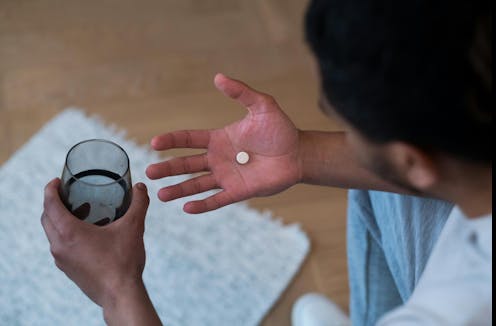Why do I need to take some medicines with food?
- Written by Mary Bushell, Clinical Associate Professor in Pharmacy, University of Canberra

Have you ever been instructed to take your medicine with food and wondered why? Perhaps you’ve wondered if you really need to?
There are varied reasons, and sometimes complex science and chemistry, behind why you may be advised to take a medicine with food.
To complicate matters, some similar medicines need to be taken differently. The antibiotic amoxicillin with clavulanic acid (sold as Amoxil Duo Forte), for example, is recommended to be taken with food, while amoxicillin alone (sold as Amoxil), can be taken with or without food.
Different brands of the same medicine may also have different recommendations when it comes to taking it with food.
Food impacts drug absorption
Food can affect how fast and how much a drug is absorbed into the body in up to 40% of medicines[1] taken orally.
When you have food in your stomach, the makeup of the digestive juices change. This includes things like the fluid volume, thickness, pH (which becomes less acidic with food), surface tension, movement and how much salt is in your bile. These changes can impair or enhance drug absorption.
Eating a meal also delays how fast the contents of the stomach move into the small intestine – this is known as gastric emptying[2]. The small intestine has a large surface area and rich blood supply – and this is the primary site of drug absorption.
Eating a larger meal, or one with lots of fibre, delays gastric emptying more than a smaller meal. Sometimes, health professionals will advise you to take a medicine with food, to help your body absorb the drug more slowly.
But if a drug can be taken with or without food – such as paracetamol – and you want it to work faster, take it on an empty stomach.
Food can make medicines more tolerable
Have you ever taken a medicine on an empty stomach and felt nauseated soon after? Some medicines can cause stomach upsets.
Metformin, for example, is a drug that reduces blood glucose and treats type 2 diabetes and polycystic ovary syndrome. It commonly causes gastrointestinal symptoms, with one in four users affected[4]. To combat these side effects, it is generally recommended to be taken with food.
The same advice[5] is given for corticosteroids (such as prednisolone/prednisone) and certain antibiotics (such as doxycycline).
Taking some medicines with food makes them more tolerable and improves the chance you’ll take it for the duration it’s prescribed.
Can food make medicines safer?
Ibuprofen is one of the most widely used over-the-counter medicines, with around one in five Australians reporting use within a two-week period[6].
While effective for pain and inflammation, ibuprofen can impact the stomach by inhibiting protective prostaglandins, increasing the risk of bleeding, ulceration and perforation[7] with long-term use.
But there isn’t enough research[8] to show taking ibuprofen with food reduces this risk.
Prolonged use may also affect kidney function, particularly in those with pre-existing conditions or dehydration.
The Australian Medicines Handbook[9], which guides prescribers about medicine usage and dosage, advises taking ibuprofen (sold as Nurofen and Advil) with a glass of water – or with a meal if it upsets your stomach.
A systematic review published in 2015[11] found food delays the transit of ibuprofen to the small intestine and absorption, which delays therapeutic effect and the time before pain relief. It also found taking short courses of ibuprofen without food reduced the need for additional doses.
To reduce the risk of ibuprofen causing damage to your stomach or kidneys, use the lowest effective dose for the shortest duration, stay hydrated and avoid taking other non-steroidal anti-inflammatory medicines[12] at the same time.
For people who use ibuprofen for prolonged periods and are at higher risk of gastrointestinal side effects (such as people with a history of ulcers or older adults), your prescriber may start you on a proton pump inhibitor[13], a medicine that reduces stomach acid and protects the stomach lining.
How much food do you need?
When you need to take a medicine with food, how much is enough?
Sometimes a full glass of milk or a couple of crackers may be enough, for medicines such as prednisone/prednisolone.
However, most head-to-head studies that compare the effects of a medicine “with food” and without, usually use a heavy meal to define “with food”. So, a cracker may not be enough, particularly for those with a sensitive stomach. A more substantial meal that includes a mix of fat, protein and carbohydrates is generally advised.
Your health professional can advise you on which of your medicines need to be taken with food and how they interact with your digestive system.
References
- ^ 40% of medicines (academic.oup.com)
- ^ gastric emptying (www.ncbi.nlm.nih.gov)
- ^ Farhad/Pexels (www.pexels.com)
- ^ one in four users affected (www.ncbi.nlm.nih.gov)
- ^ advice (amhonline.amh.net.au)
- ^ within a two-week period (www.abs.gov.au)
- ^ bleeding, ulceration and perforation (www.tandfonline.com)
- ^ isn’t enough research (www.ncbi.nlm.nih.gov)
- ^ Australian Medicines Handbook (amhonline.amh.net.au)
- ^ Tbel Abuseridze/Unsplash (unsplash.com)
- ^ A systematic review published in 2015 (www.ncbi.nlm.nih.gov)
- ^ non-steroidal anti-inflammatory medicines (www.betterhealth.vic.gov.au)
- ^ proton pump inhibitor (australianprescriber.tg.org.au)
Read more https://theconversation.com/why-do-i-need-to-take-some-medicines-with-food-235782

















